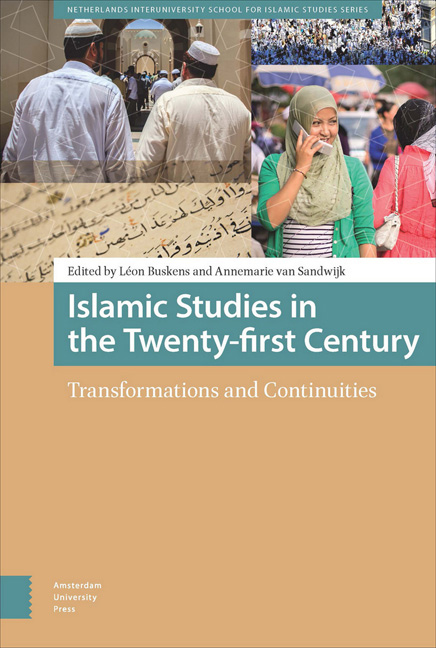Book contents
- Frontmatter
- Dedication
- Contents
- Preface
- Introduction: Dichotomies, Transformations, and Continuities in the Study of Islam
- Islamic Texts: The Anthropologist as Reader
- Textual Aspects of Religious Authority in Premodern Islam
- What to Do with Ritual Texts: Islamic Fiqh Texts and the Study of Islamic Ritual
- Textual Study of Gender
- Scholarship on Gender Politics in the Muslim World: Some Critical Reflections
- Power, Orthodoxy, and Salvation in Classical Islamic Theology
- Dialectical Theology in the Search for Modern Islam
- “Classical” Islamic Legal Theory as Ideology: Nasr Abu Zayd’s Study of al-Shafiʿi’s al-Risala
- Islamic Law in the Modern World: States, Laws, and Constitutions
- Vernacular Cosmopolitanism as an Ethical Disposition: Sufi Networks, Hospitality, and Translocal Inclusivity
- Middle Eastern Studies and Islam: Oscillations and Tensions in an Old Relationship
- Notes on Contributors
- Overview of NISIS Autumn Schools, 2010-2014
- Index
Textual Aspects of Religious Authority in Premodern Islam
Published online by Cambridge University Press: 12 December 2020
- Frontmatter
- Dedication
- Contents
- Preface
- Introduction: Dichotomies, Transformations, and Continuities in the Study of Islam
- Islamic Texts: The Anthropologist as Reader
- Textual Aspects of Religious Authority in Premodern Islam
- What to Do with Ritual Texts: Islamic Fiqh Texts and the Study of Islamic Ritual
- Textual Study of Gender
- Scholarship on Gender Politics in the Muslim World: Some Critical Reflections
- Power, Orthodoxy, and Salvation in Classical Islamic Theology
- Dialectical Theology in the Search for Modern Islam
- “Classical” Islamic Legal Theory as Ideology: Nasr Abu Zayd’s Study of al-Shafiʿi’s al-Risala
- Islamic Law in the Modern World: States, Laws, and Constitutions
- Vernacular Cosmopolitanism as an Ethical Disposition: Sufi Networks, Hospitality, and Translocal Inclusivity
- Middle Eastern Studies and Islam: Oscillations and Tensions in an Old Relationship
- Notes on Contributors
- Overview of NISIS Autumn Schools, 2010-2014
- Index
Summary
In People of the Book: Canon, Meaning, and Authority, Moshe Halbertal described Judaism as a “text-centered community” (Habertal 1997). What he meant is that Judaism, as a community, is defined by the texts, principally the Torah and the Talmud, which it placed at the centre of its religious experience. In his analysis, it was not an idea about God which distinguished a Jew. As Halbertal pointed out, historically Jews have had radically different, even contradictory conceptions of the deity. Nor was Judaism defined by ritual, not even a ritual as central to Jewish identity as circumcision. It was rather the text, or certain texts, and the way in which those texts were employed both in religious discourse and in social life, which gave to the Jewish tradition its coherence. And not just Jewish identity, but Jewish divisions. Attitudes towards the foundational texts lie at the heart of the major sectarian divisions within the Jewish world. For example, it is a textual dispute which in the Middle Ages marked the difference between Rabbanites and Karaites: the Rabbanites accepting the authority of the Talmud in addition to the Bible; the Karaites rejecting the authority of anything but the canonical scriptures.
Change a key term or text, and these remarks also describe the situation in Islam. For the Torah and Talmud, substitute the Qurʾan and the hadith – the word of God and the words of his Prophet. The texts may be different, but Islam, too, is a “text-centered community.”
Of course, behind the simple focus on texts lies a more complex reality, not least because the text or texts in question are not easily defined. In the case of Judaism, the Torah alone is not the text: it is the Torah plus the Mishnah and the Talmud plus the entire universe of commentaries on the sacred texts which define the tradition. Islam constitutes a “text-centered community” in precisely analogous terms. It is not the Qurʾan and hadith alone which define the community, but a complex array of commentaries on those texts – especially those commentaries which came to define Islamic law.
As an observation about Islam, all this is, perhaps, self-evident. But it has very important consequences for Islamic history.
- Type
- Chapter
- Information
- Islamic Studies in the Twenty-first CenturyTransformations and Continuities, pp. 47 - 66Publisher: Amsterdam University PressPrint publication year: 2017



